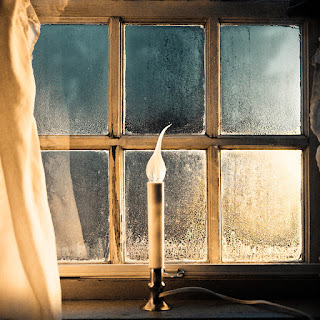I woke up early on this day when the days begin to grow longer, and sat for a while in the glow of the Christmas tree lights as the sky brightened in the window behind me. Daytime will be just a little bit longer today, one day after the winter solstice. For now, at 7:15am on December 22, 2020, I'll let that be a sign for me of growing hope for a better world in 2021. Or, more realistically, of the presence of hope and grace even in sad and painful times.
Easier said than done. Hope and grace are more easily felt in the early morning quiet than in the late afternoon, when the sun goes down too soon after too many hours of screens and stress and clamor. Of trying to construct or reconstruct real human voices behind the black and white paragraphs of news or the endless strings of emails.
I have felt at times like I am holding my breath through this pandemic. Or letting go and then quickly holding it again. Tears creep into my eyes and throat too easily these days, often cued by singing or memories of singing or trying to sing. I have been in church every Christmas of my entire life (with the possible exception of the year I was in first grade and didn't get to say my "piece" in the Christmas Eve service because I was sick). Christmas at home, without the familiar rituals of church-going, choir-singing, and family gatherings afterward will be tough. And Christmas without music-making -- dear God! When it comes to music, it's the making of it that matters most to me.
I have spent very little time making music during this pandemic, but I am making hats. I think it's an even dozen, or will be when I finish the one I cast onto my knitting needles last night. I've also knit two sweaters, finished a third one, knit a couple pairs of socks and two lace shawls. There is no sound in knitting, but there is rhythm and sensation in the hands. The product does not float on air and then disappear. It lasts. I don't find tears welling up in my throat when I pick up my knitting. I find comfort there instead, and breath.
Oh, this post, more labored over than a reader could know. What meaning can be found in breath-holding, music-making, post-solstice sunrises, yarn and hope and grace? And why even try? These are dark days, even under a brightening winter sky. I've prayed this morning for peace for the dying.And prayed for grit and determination for the rest of us.
“Glory to God in the highest heaven," sang the angels, "and on earth peace among those whom he favors!” They lit up the night sky, those angels. Had the shepherds ceased to be "sore afraid" by then? Did their fear dissolve into wonder? Did the light in the sky illuminate their hearts, as the rising sun is now showing me the inner branches at the top of my Christmas tree? Did they find hope and grace in the morning light of the manger?
"Marshfield Christmas Dawn II" by docmartini is licensed under CC BY-NC-ND 2.0


